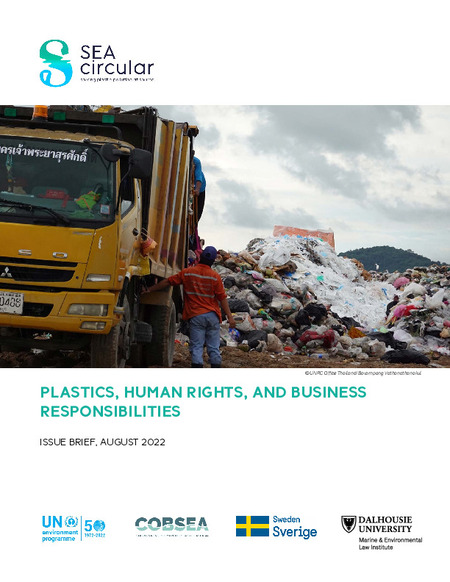| dc.contributor | Asia & Pacific Office | en_US |
| dc.contributor.author | Dalhousie University | en_US |
| dc.contributor.author | | en_US |
| dc.contributor.other | Dalhousie University | en_US |
| dc.coverage.spatial | Asia and the Pacific | en_US |
| dc.date.accessioned | 2023-02-16T10:07:13Z | |
| dc.date.available | 2023-02-16T10:07:13Z | |
| dc.date.issued | 2022-08 | |
| dc.identifier.uri | https://wedocs.unep.org/20.500.11822/41851 | |
| dc.description | A human rights-based approach informed by international human rights law to prevent and manage plastic pollution at each stage of the plastics lifecycle can build the capacity of those with the power to act responsibly in the face of the plastics challenge—governments and businesses. This issue brief provides an overview of a human rights-based approach to plastic pollution informed by international human rights law at each stage of the plastics lifecycle and illustrates what must be done to protect the interests of rights holders while ensuring that duty bearers are held accountable. | en_US |
| dc.format | pdf | en_US |
| dc.language | English | en_US |
| dc.relation.ispartof | SEA Circular | en_US |
| dc.rights | Public | en_US |
| dc.subject | pollution control | en_US |
| dc.subject | plastic waste | en_US |
| dc.subject | human rights | en_US |
| dc.subject | business | en_US |
| dc.subject | Southeast Asia | en_US |
| dc.title | Plastics, Human Rights, and Business Responsibilities - Issue Brief August 2022 | en_US |
| wd.identifier.sdg | SDG 3 - Good Health and Well-being | en_US |
| wd.identifier.sdg | SDG 10 - Reduced Inequalities | en_US |
| wd.topics | Chemicals and Pollution Action | en_US |
| wd.identifier.pagesnumber | 10 p. | en_US |


